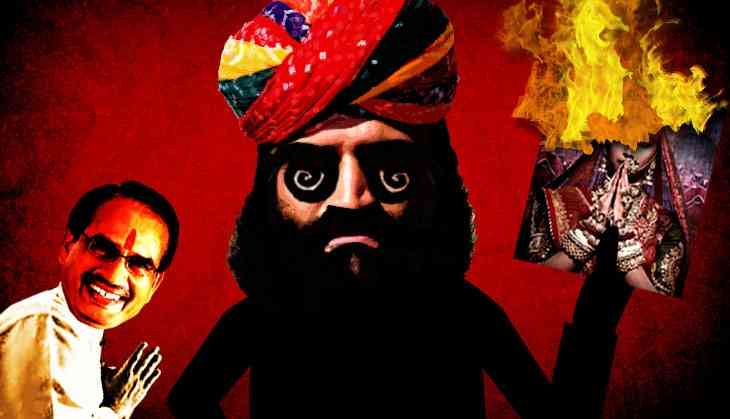Rashtramata Padmavati? BJP leaders can outdo even the party’s looniest fringe

Some politicians have a knack of outdoing themselves long after one would have accepted that they had reached their lowest point. The never-ending saga of controversy over the Bollywood movie Padmavati is one such case. The lumpenism of fringe groups opposing the movie on whimsical grounds could have been ignored, but for mainstream political parties which have made matters worse by jumping in.
Madhya Pradesh Chief Minister Shivraj Singh Chouhan's over-enthusiastic response to the controversy indicates the BJP's formal adoption of a silly campaign launched by a fringe group. Chouhan didn't just protest what he called “distortion of historical facts” in the yet to be released film, he also banned its release in the state he governs.
The CM went on to declare the fictional queen Padmini as “Raashtramata” (Mother of the Nation) and announced a memorial and an award in her name.
Maharani Padmavati's memorial will be established in the state capital to display her valor and sacrifice. People working for the betterment of women will be conferred with #RashtrmataPadmavatiPuraskar. pic.twitter.com/KlEbFnRfJN
— CMO Madhya Pradesh (@CMMadhyaPradesh) November 20, 2017
Chouhan is not just one of BJP's 14 CMs, he is also a member of the party's highest decision-making body, the BJP Parliamentary Board. His official stand is nothing short of an expression of his party's policy. In any case, he is not the only BJP leader who has supported the misplaced protests against the movie.
Chief Minister of BJP-ruled Rajasthan Vasundhara Raje has said that the movie will not be released in her state if “necessary” changes were not made. The BJP government in Uttar Pradesh has already indicated tacit support by saying there was “public anger” over the movie, that it had “distorted historical facts” and that it could have an “adverse effect” on the law-and-order situation in the state.
UP Chief Minister Yogi Adiyanath has said that director Sanjay Leela Bhansali is “guilty of hurting people’s sentiments”. In Haryana, the chief of the party's media cell in the state announced a bounty of Rs 10 crore on the heads of Bhansali and actress Deepika Padukone, who has essayed the role of the queen.
Bound by a baffling commitment to an elusive “Rajput pride”, some Congress leaders have also backed this campaign. These include Punjab CM Amarinder Singh and MP Sanjay Sinh, both former royals. However, many Congress leaders have spoken out against these protests and in favour of artistic freedom.
Karnataka CM Siddaramaiah has slammed the threats calling them “yet another sign of growing intolerance and bigotry in the country”. He also condemned “the culture of intolerance and hate perpetuated by BJP."
Congress MP Shashi Tharoor had taken a jibe at the 'royals' feeling hurt by the movie, saying, “these so called valorous maharajas, who today are after a Mumbai filmmaker because their honour is at stake, they were less concerned about their honour when the British were trampling all over it”.
Trinamool Congress chief and West Bengal CM Mamata Banerjee made the sharpest statement, calling the controversy “super emergency” and “a calculated plan of a political party to destroy the freedom to express ourselves”.
The #Padmavati controversy is not only unfortunate but also a calculated plan of a political party to destroy the freedom to express ourselves. We condemn this super emergency. All in the film industry must come together and protest in one voice
— Mamata Banerjee (@MamataOfficial) November 20, 2017
The brouhaha has pushed the CBFC to return the movie to its makers, asking them to 'complete' their application and submit it again. The producers have reportedly postponed the release date for now, with some reports claiming the movie will be able to see the light of the day only in 2018.
Padmavati: history or legend?
The 'freedom of expression' debate apart, the ironic part of the entire controversy appears to have entirely escaped the protesting 'Rajputs'. First, historians do not believe Padmini is a real figure, with the queen first appearing in a sixteenth century poem, Padmavat.
Secondly, even the fictional character of Padmini is not a Rajput but a Sinhala princess from what is now known as Sri Lanka. Third, there is not much valour to be associated with King Ratansen, the ruler of Chittor in Rajasthan who has only a string of defeats to his credit. He attacks the fortress of Singhal to take the princess away, only to be defeated and captured.
A change of heart makes the Sinhala king forgive Ratansen and marry Padmini to him. Back in his kingdom, he again suffered a defeat at the hands of Sultan Alauddin Khilji. Rescued somehow by some of his vassals, he eventually dies at the hands of another Rajput king, Devpal of Kumbhalgarh.
Even Ratansen’s Rajput origin has not been conclusively proven. His historical equivalent Ratnasimha, ruler of Mewar, belonged to the Rawal branch of the Guhila dynasty, originally traced to Vadnagar, Gujarat. Some historians even claim the Guhilas were Brahmins who later became kings.
Of course, none of this matters to the hot-heads who want the film banned and the people behind it decapitated. However, why should mainstream political leaders bow to their lumpenism?
First published: 21 November 2017, 20:13 IST

